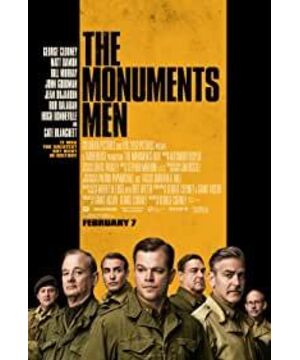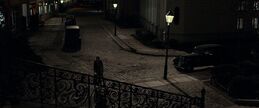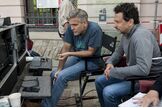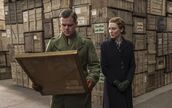The narrative period of the entire film is at the end of the war, and the tone of the war is relatively relaxed and gentle. Think about it, you can eat high-quality biscuits sent home in the battlefield; everyone can listen to the melodious Jazz to deal with patients; Parisian women can start painting red lips and swaying romance again; lighting a cigarette for the enemy, sitting on the ground, Everyone can happily put down their guns and leave a way for each other. The most important thing is that the deaths of the two treasure hunters did not happen while directly maintaining the artwork. The director's description of death was also more positive. On the front, the lens is simple, and it has been taken in one stroke. Therefore, following the rhythm of the entire narrative, the audience can easily accept that Art is more valuable than life.
But in fact, what I want to say is that we simply accept that Art is greater than life because Art and life are not caught in an either-or frontal conflict at the same time. The person in question was not poked in the chest by Shang’s smoking muzzle, and threatened by the fierce-looking Nazis, "If you don’t give Lao Tzu this picture, you will be shot to death." A conflict similar to this is weakened by the director, so we I can't feel the threat and fear brought by war, and at the same time, it can't give birth to our instinctive desire to maintain life. In addition, it is no regrets that the deceased has passed away, but there is an important person behind the deceased who is also weakened by the director. This person is a family member. The director left out the description of the state of the family of the deceased, but in the form of a chasing meeting that sacrificed their lives for the country and gave the family the greatest hat in the whole country, which also allowed others to vent their widowed husbands, What about the pain of losing a child or losing a father?
On the whole, this film is more suitable for literary and art workers who have a certain foundation in art, at least those who have the function of "automatic scan code" for works of art such as paintings and sculptures. The most exciting moment of the film should be to find one after another famous paintings and sculptures in the abandoned mines. Looking at the expressions and listening to the music, I feel that this is really a delight, but because I can’t sweep it out. "Those works of art can't weigh their value to human civilization. I am really ashamed that I don't have the scan code function yet, and I just feel that I can't come up at the time of the climax.
View more about The Monuments Men reviews











